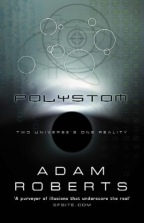Adam Roberts has got some very particular bees in his bonnet. He
doesn't merely cross genres - he finds wormholes between them. He
is the wormhole between horror, science fiction, political
polemics and war stories. With an anti-sentimental streak as wide and
As vicious as an LA freeway, he's not exactly a friendly writer
either. Good thing he writes easy-to-read prose and has a powerful
mind able to nail down those obtuse and imaginative worlds of logic
he loves to create. He's an expert at putting readers simultaneously
on the ground, in his characters' shoes and in the sky-high pie that
he's inevitably constructed. His characters are so grounded largely
because they tend to be most unpleasant. Roberts, like Chuck
Palahniuk, isn't in the least bit concerned about sympathetic
characters. His men are clueless and often vicious thugs. His upper
class twits tread on the underclasses with nary a concern. It's all
so realistic one is grateful to find these characters placed
convincingly into Roberts' scientific flights of fancy. And they are
welcome, as nobody comes close to Roberts in whipping up a scenario
that is simultaneously mind-boggling and oddly credible.
Well-written, vaguely hostile, wildly weird and convincing - that's
what you get with an Adam Roberts' novel.
'Polystom', his fourth novel, is no exception, but it's certainly
an extension. The ingredients are as intriguing as ever. 'Polystom'
is set in a solar system where the atmosphere extends between the
planets. The feckless aristocrats who run the worlds are able to fly
from one planet to another in biplanes. Polystom is the fiftieth
Steward of Enting, unlucky at love, unlucky in his family
relationships and unlucky in war. Each of the three books consists of
chapters called "leaves". The first tells Polystom's love story, the
second is a "murder story" about the death of his uncle Cleonicles,
the third a "ghost story" that is really a tale of war and woe.
The book may seem a bit slow at first, but Roberts' prose is very
smooth and the pages eventually start quickly melting beneath the
reader's assault. Roberts' universe design allows for some
spectacular visual bonanzas, and he parlays these into some very
effective scenic descriptions. Polystom's love story is vintage
Roberts, all pent-up frustration verging on violence combined with
fumbling stumbles towards genuine emotion. Seeking help from his
romantic woes, Polystom consults Cleonicles, his famous uncle who has
invented a Computational Device far larger than any before it. But
Cleonicles is caught up in his invention. He's not much help for
Polystom. Even after he's murdered as part of social insurrection, he
causes Polystom problems. But it is Cleonicles' funeral and a
horrific act of execution that combine to send Polystom as a
volunteer captain in the fight against rebels on what is called
Mudworld. There he experiences war a la Roberts - gritty and
horrific. But that's only the start of the journey.
One of the great charms of Roberts' work is that in spite of all
his SF trappings, his books don't read particularly like SF. Here we
have a Roman setting that strikes the reader as very much like a
retro-Asimov piece. The civilization of 'Polystom' is actually at a
lower technological level than ours. It makes the books very easy to
read, and creates an odd tension between the almost reality of the
novel and the actual reality experienced by the reader. Of course,
all of this is simply part of a larger plan by Roberts.
Roberts has an idea behind 'Polystom' that will certainly mess
with readers' perceptions; it's a book that will directly affect how
you see what you see around you. He's also got some pretty damn
fascinating physics for the reader to unravel. It's so fascinating
that there's no reader who won't at least want to go to the Polystom
Website (http://www.polystom.com). Once you get there, prepare to
lose the rest of whatever daylight is left, and much of the night
that follows; but don't go there until you've read the novel.
Stanislaw Lem, Philip K. Dick, and Isaac Asimov are all granulated
into Roberts' very original mix. But Roberts' is going for even more;
he conducts a literary, not a merely science fictional experiment
with 'Polystom'. As you read, as your perceptions are warped without
your permission, you'll realize that you're a test subject. Sit back;
relax; read. This isn't going to hurt one bit.
